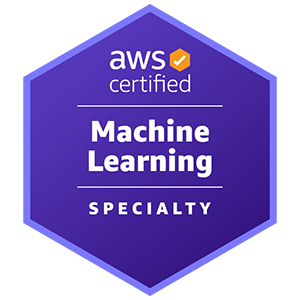Are you looking to become a certified AWS Machine Learning Specialty expert? Passing the AWS Machine Learning Specialty Exam can be a daunting task, but with the right preparation and mindset, you can easily ace the exam. In this article, we will provide you with the ultimate guide on How To Pass the AWS Machine Learning Specialty Exam (EASY).
With the growing demand for machine learning experts, it’s essential to have a certification that proves your skills and knowledge. The AWS Machine Learning Specialty Exam is one of the most sought-after certifications that showcase your expertise in this field. This article will help you understand what it takes to pass the exam and provide you with tips and tricks to ensure your success.

How To Pass the AWS Machine Learning Specialty Exam (EASY)
Understand the Exam Format
Before diving into the exam, it’s crucial to understand the exam format. The AWS Machine Learning Specialty Exam consists of 65 multiple-choice and multiple-answer questions, and you have 3 hours to complete the exam. You will need to score 75% or higher to pass the exam.
Know the Exam Topics
To pass the AWS Machine Learning Specialty Exam, you need to be familiar with the exam topics. The exam covers various machine learning concepts, such as data engineering, exploratory data analysis, modeling, and machine learning implementation and operations. Here’s a breakdown of the exam topics:
- Domain 1: Data Engineering
- Domain 2: Exploratory Data Analysis
- Domain 3: Modeling
- Domain 4: Machine Learning Implementation and Operations
Domain 1: Data Engineering
Data Engineering is the foundation of machine learning. This domain covers various topics related to data, such as data storage, data processing, data transformation, and data analysis. Here’s what you need to know to pass this domain:
- Understand data storage technologies, such as S3, Redshift, and DynamoDB.
- Be familiar with data processing technologies, such as Glue, EMR, and Data Pipeline.
- Know how to transform data using tools like AWS Lambda, AWS Glue, and AWS Step Functions.
- Understand how to perform data analysis using tools like Amazon Athena, Amazon QuickSight, and AWS Glue.
Domain 2: Exploratory Data Analysis
Exploratory Data Analysis (EDA) is the process of analyzing and summarizing data sets. This domain covers various EDA techniques, such as data visualization, data cleaning, and data normalization. Here’s what you need to know to pass this domain:
- Know how to perform data visualization using tools like Amazon QuickSight, Amazon SageMaker, and AWS Glue.
- Be familiar with data cleaning techniques, such as outlier detection and missing data imputation.
- Understand data normalization techniques, such as feature scaling and feature engineering.
Domain 3: Modeling
Modeling is the heart of machine learning. This domain covers various modeling techniques, such as supervised learning, unsupervised learning, and deep learning. Here’s what you need to know to pass this domain:
- Understand supervised learning techniques, such as linear regression, logistic regression, and decision trees.
- Know how to perform unsupervised learning using techniques like k-means clustering and PCA.
- Be familiar with deep learning techniques like convolutional neural networks (CNN) and recurrent neural networks (RNN).
Domain 4: Machine Learning Implementation and Operations
This domain covers various topics related to machine learning implementation and operations, such as deploying models, monitoring, and troubleshooting. Here’s what you need to know to pass this domain:
- Know how to deploy machine learning models using services like Amazon SageMaker and AWS Lambda.
- Be familiar with model performance monitoring techniques, such as CloudWatch and X-Ray.
- Understand how to troubleshoot machine learning models using techniques like log analysis and error analysis.
Tips to Pass the Exam
Now that you know the exam format and topics, here are some tips to help you pass the AWS Machine Learning Specialty Exam:
- Study the Exam Guide: The AWS Machine Learning Specialty Exam Guide provides detailed information on the exam format, topics, and sample questions. Make sure you study the guide thoroughly.
- Practice with Sample Questions: AWS provides sample questions that help you understand the exam format and topics. Practice with as many sample questions as possible to gain confidence and improve your chances of passing the exam.
- Join Study Groups: Joining study groups can help you prepare for the exam more efficiently. Discussing topics with peers can help you gain new perspectives and insights.
- Take Practice Tests: Taking practice tests can help you identify your strengths and weaknesses. Focus on your weak areas and work on improving them.
- Use Exam Dumps with Caution: Exam dumps are not reliable sources of exam questions. Relying on exam dumps can result in disqualification and damage to your reputation.
FAQs
Q: How much does the AWS Machine Learning Specialty Exam cost?
A: The AWS Machine Learning Specialty Exam costs $300.
Q: How long is the AWS Machine Learning Specialty Exam?
A: The AWS Machine Learning Specialty Exam is 3 hours long.
Q: What is the passing score for the AWS Machine Learning Specialty Exam?
A: The passing score for the AWS Machine Learning Specialty Exam is 75%.
Q: Can I retake the AWS Machine Learning Specialty Exam if I fail?
A: Yes, you can retake the AWS Machine Learning Specialty Exam if you fail. However, you have to wait for 14 days before you can retake the exam.
Conclusion – AWS Machine Learning Specialty
Passing the AWS Machine Learning Specialty Exam requires dedication, hard work, and proper preparation. By following the tips and strategies provided in this article, you can easily ace the exam and become a certified AWS Machine Learning Specialty expert. Remember to study the exam guide thoroughly, practice with sample questions, and join study groups to enhance your preparation. Good luck with your exam!
Leave a Comment!